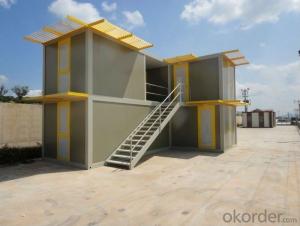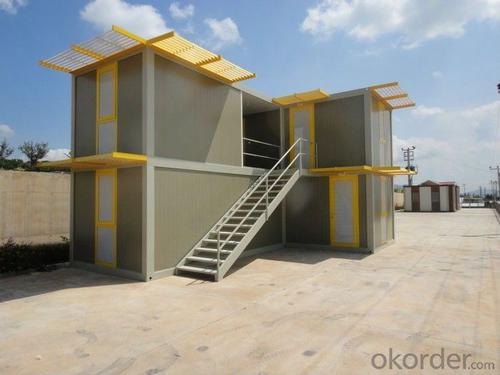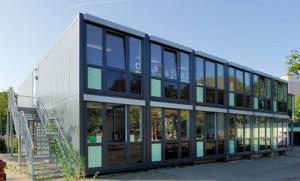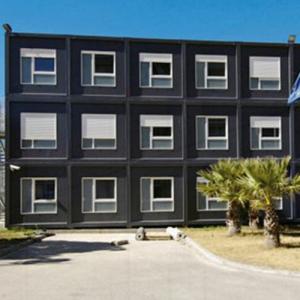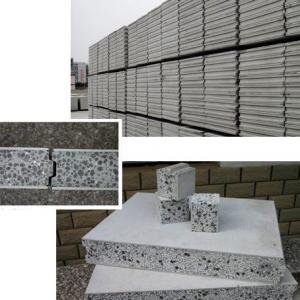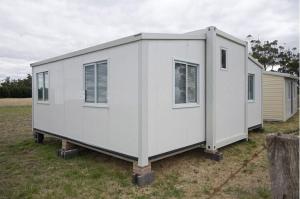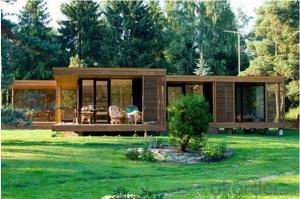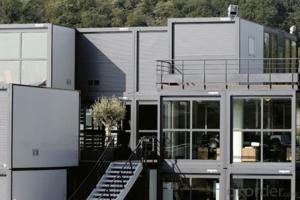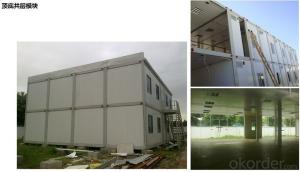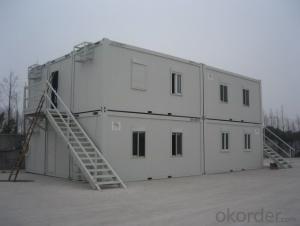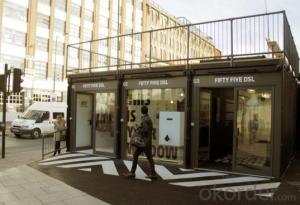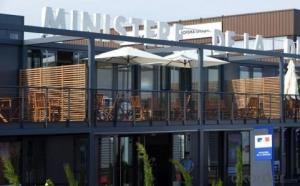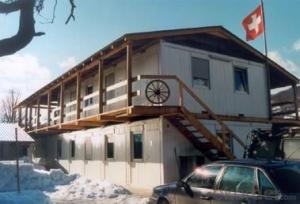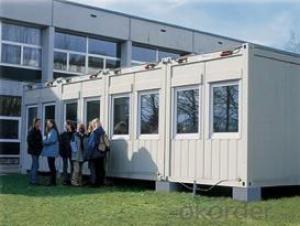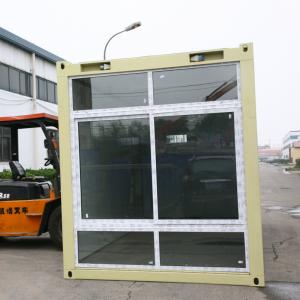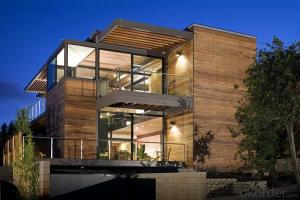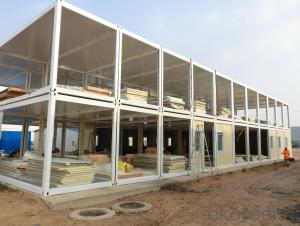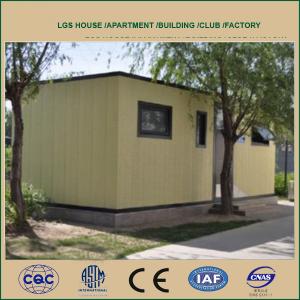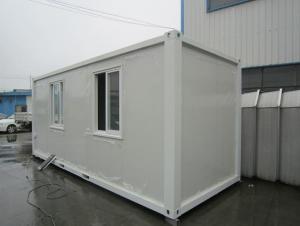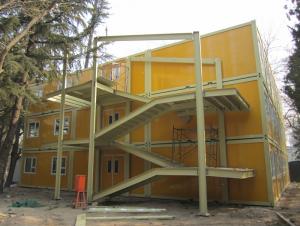High quality decorated movable container house
- Loading Port:
- China Main Port
- Payment Terms:
- TT OR LC
- Min Order Qty:
- -
- Supply Capability:
- -
OKorder Service Pledge
OKorder Financial Service
You Might Also Like
High quality decorated movable container house
Description
The container house is movable as a whole unity. This kind of container house is reusable usually as offices in domestic areas other than as habitable houses. Using a kind of 1150 modulus design, with security nets, doors and floor tile, its firm and safe. Cabinet unit structure for the introduction of steel and cold-formed steel welded together to make up standard components. The house can be designed just as just one unit or connected to a whole from several boxes, by simple connection such as bolts. Easy to assemble.
Container house has a wide range of applications. It can be used in temporary construction site, commercial industry, civil, military and other fields.
Technical Parameters
1).Designed and developed according to the standard size of shipping container;
2).Heatproof and waterproof;
3).Widely used as office, meeting room, dormitory, shop, booth, toilet, storage, kitchen, shower room, etc.
4).Size: 6058 * 2435 * 2790mm;
5).Components: adopts EPS, PU, or rock wool as heat insulation material;
6).All the components of the container house are up to standard and prefabricated with the advantage of easy installation and uninstallation.
7).Easy assembly and disassembly: Only six skilled workers are needed to finish three modular units in 8 hours;
8).One 40ft HQ container can load six sets of 5,950 x 2,310 x 2,740mm standard units or six sets of 6,055 x 2,435 x 2,740mm standard units;
9).The standard unit can be connected together at any direction or stack up to two or three stories;
10).Waterproof design of structure, fireproof, and heat insulation of material ensure the house to resist heavy wind load of 1.5kN/m2 and 7° seismic intensity;
11).Lifespan of the house: 20 to 25 years.
Advantage & Basic Design
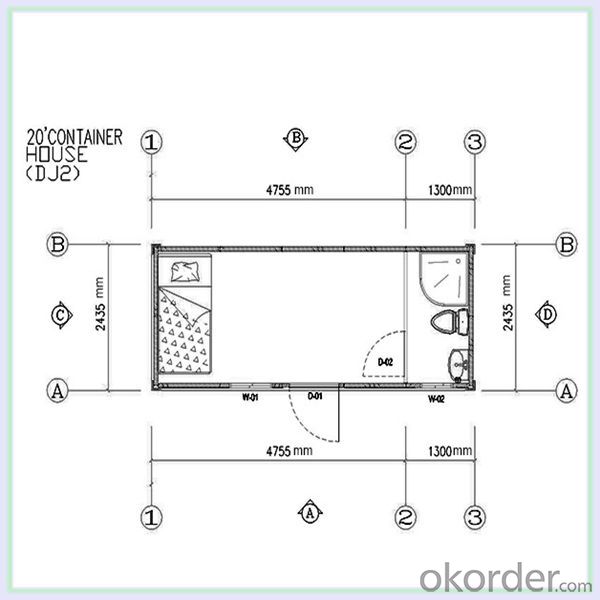
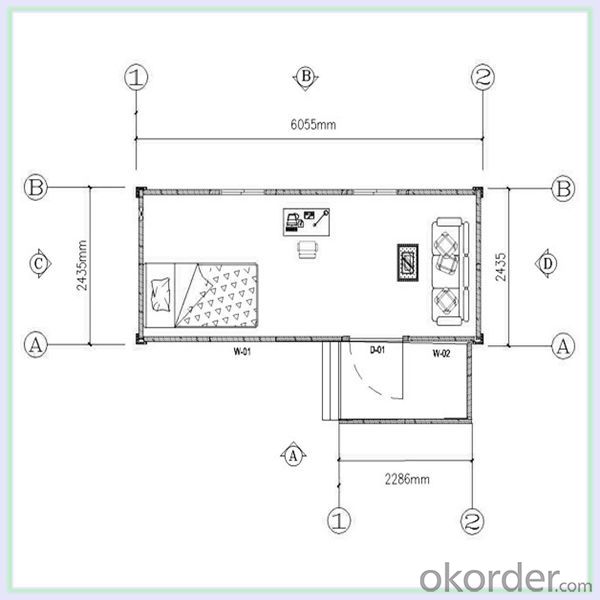

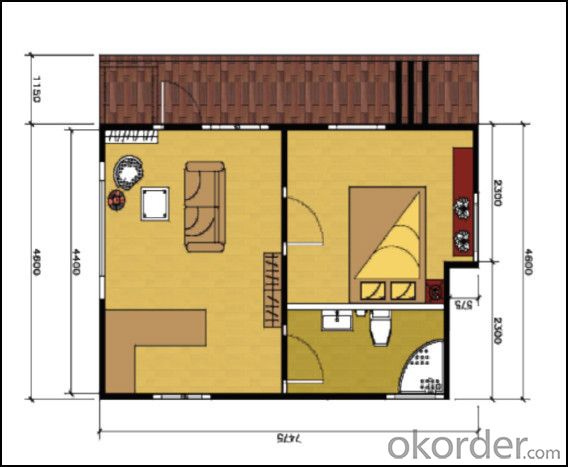
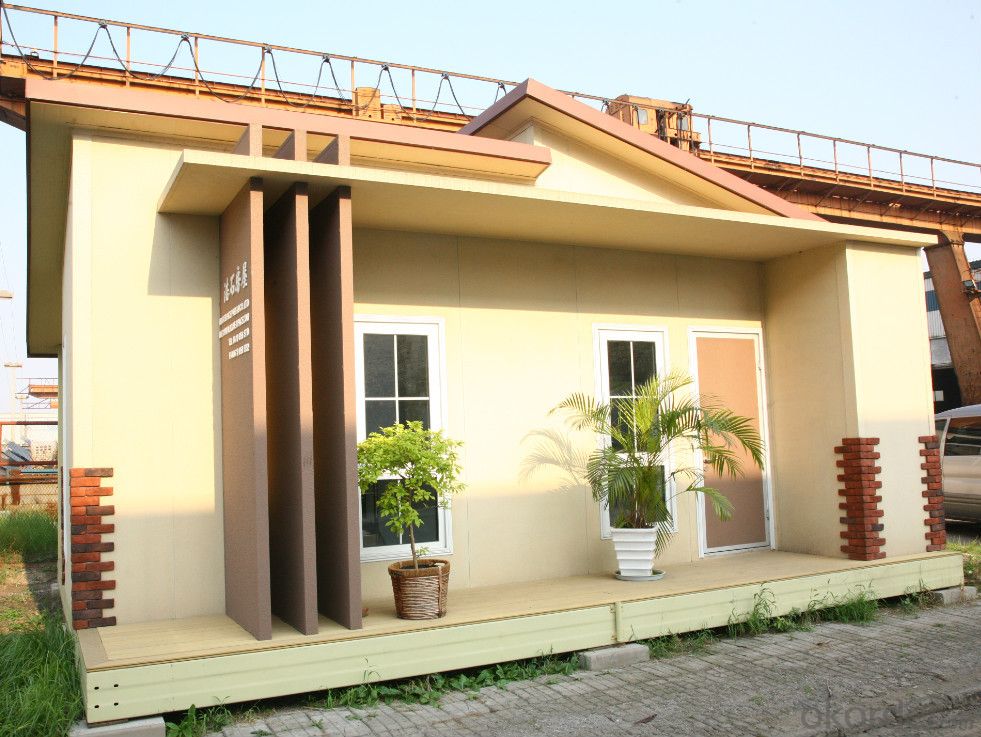
| Construction Efficiency | 2 worker in one day for one unit |
| Long life time | Max. 20 years |
| Roof load | 0.5KN/sqm (can reinforce the structure as required) |
| Wind speed | designing wind speed: 210km/h (Chinese standard) |
| Seismic resistance | magnitudes 8 |
| Temperature | suitable temperature.-50°C~+50°C |
Factory & Shippment
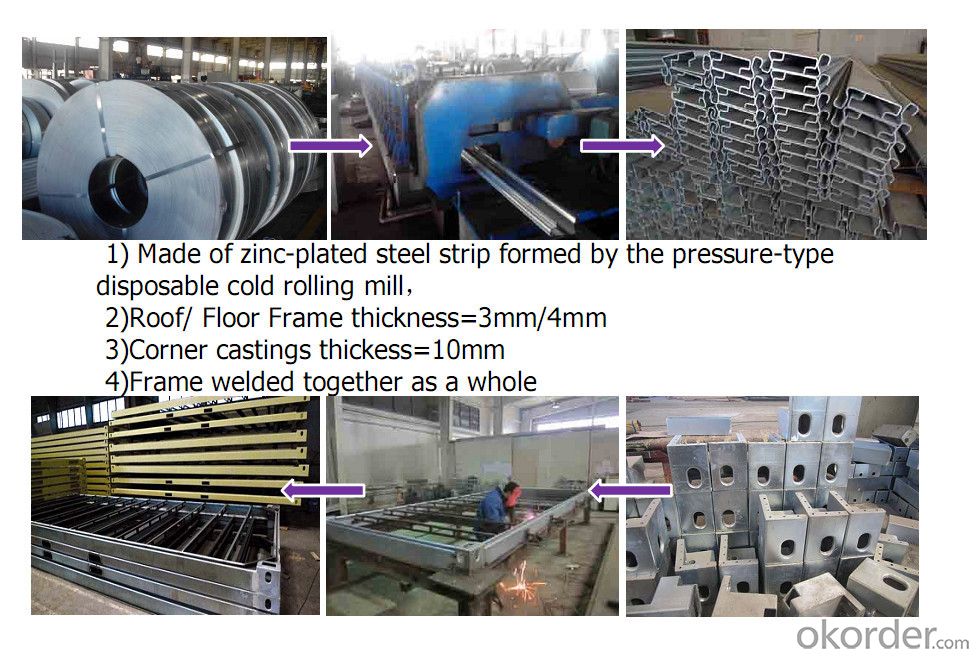
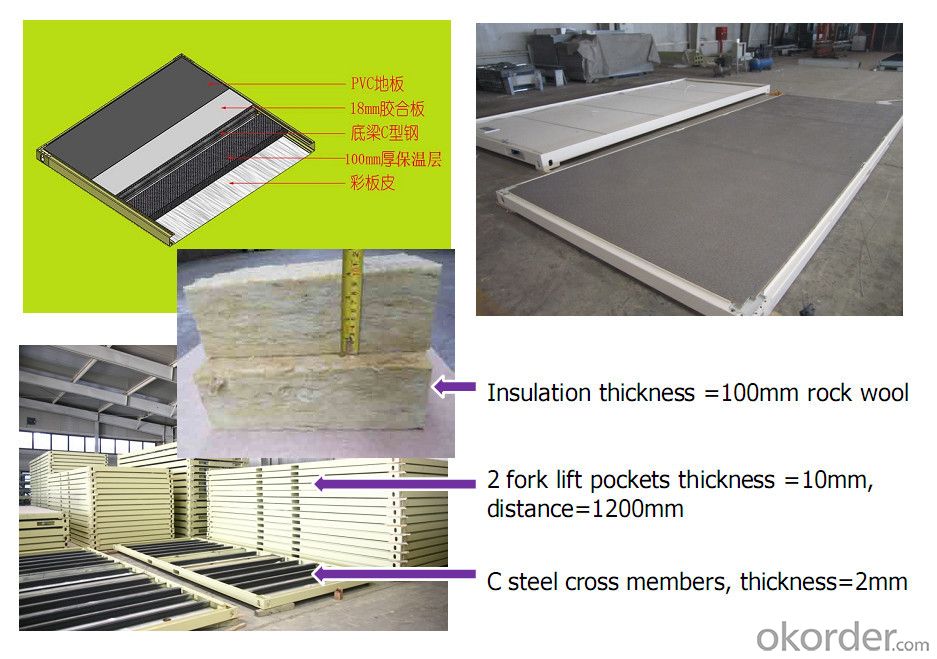
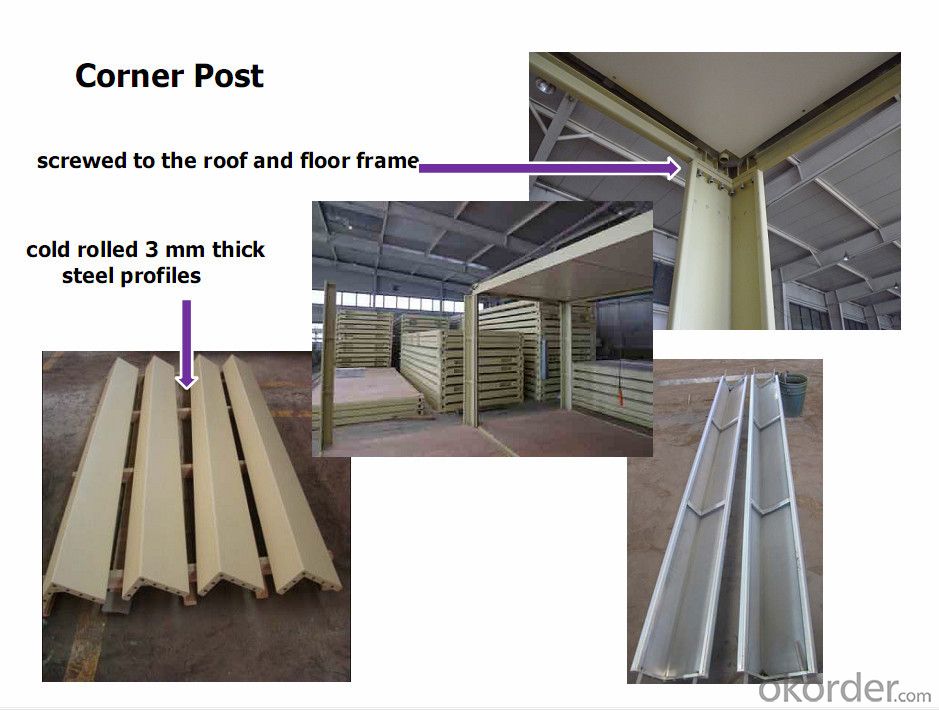

Application
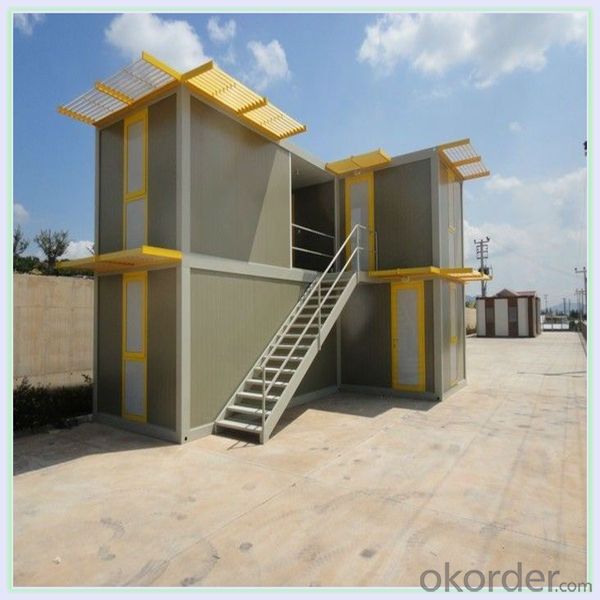
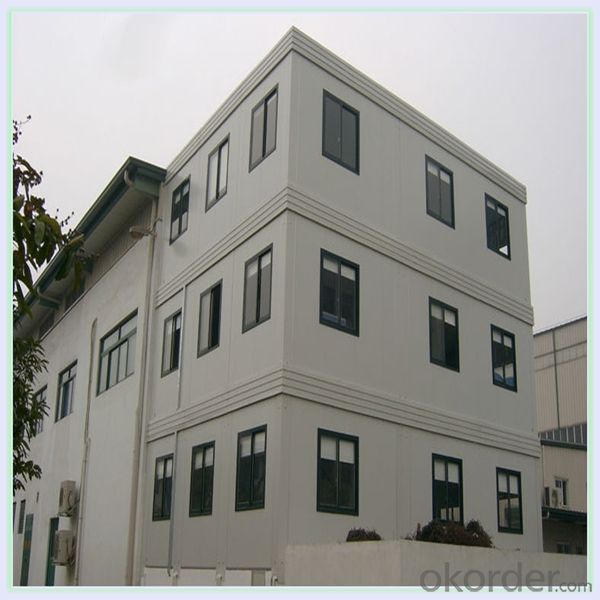
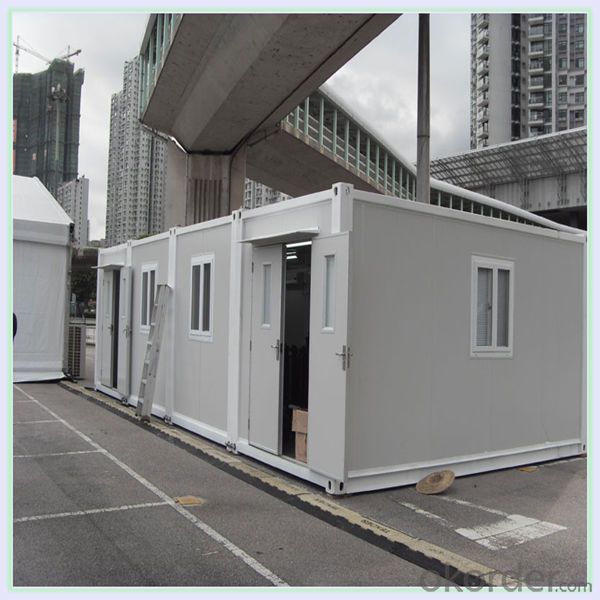
- Q: Are container houses suitable for individuals with mobility issues?
- Container houses can be suitable for individuals with mobility issues, as they can be designed and modified to accommodate specific accessibility needs. Features such as ramps, wider doorways, grab bars, and open floor plans can be incorporated into container houses to improve accessibility and ease of movement. Additionally, container houses can be built on a single level, eliminating the need for stairs or elevators. However, it is essential to work with an experienced architect or designer who specializes in accessible design to ensure that the container house meets the specific requirements of individuals with mobility issues.
- Q: Can container houses be built with a garage or carport?
- Yes, container houses can be built with a garage or carport. These additional structures can be designed and constructed alongside the main container house, providing convenient storage and protection for vehicles.
- Q: What are the advantages of the container house?
- Third, the sealing performance is good, strict manufacturing process so that this activity room has a good watertight;
- Q: Can container houses be designed with a home theater or entertainment room?
- Certainly, container houses have the ability to be designed with a home theater or entertainment room. By implementing the appropriate planning and design techniques, container houses can be transformed into modern and comfortable living spaces that cater to a variety of needs, such as entertainment. The adaptability of container homes allows for customization and imaginative utilization of space, enabling the incorporation of a home theater or entertainment room. One possibility is to designate a specific section of the container house solely for this purpose. By dividing a larger container into separate rooms, it becomes possible to create a dedicated area for entertainment. This can be achieved by utilizing walls, dividers, or curtains, depending on the desired level of privacy and soundproofing. Another option is to utilize the open floor plan of the container house in order to seamlessly integrate the entertainment area with the rest of the living space. By strategically arranging furniture, equipment, and audiovisual components, it becomes possible to create a cohesive and functional entertainment area within the container. This allows for a versatile space that can be used for both entertainment and everyday living. To enhance the cinematic experience, it is vital to consider the acoustics and lighting of the container house. By implementing proper insulation, soundproofing materials, and strategically placing speakers, it is possible to create an immersive audio experience. Furthermore, the installation of dimmable lights or blackout curtains can enhance the movie-watching experience by creating an ambiance reminiscent of a theater. In conclusion, container houses have the potential to be designed with a home theater or entertainment room, providing a comfortable and enjoyable space for leisure activities. By engaging in meticulous planning and employing innovative design solutions, container homes can offer all the amenities and functionality of traditional houses, including spaces for entertainment and relaxation.
- Q: Are container houses suitable for eco-friendly living?
- Eco-friendly living can be achieved through the use of container houses. These unique homes are constructed from repurposed shipping containers, which not only reduces the need for new materials but also helps minimize waste. By reusing these containers, we effectively recycle and diminish the carbon footprint associated with traditional housing construction. Furthermore, container houses have the potential to be designed with energy efficiency in mind. By implementing proper insulation and ventilation systems, these homes can effectively regulate temperature, resulting in reduced reliance on excessive heating or cooling. This leads to energy conservation and a decrease in greenhouse gas emissions. Moreover, container houses are well-suited for incorporating sustainable features. Homeowners can equip their container houses with solar panels, allowing for the generation of clean, renewable energy and a reduced dependence on fossil fuels. Additionally, the installation of rainwater harvesting systems enables homeowners to collect and reuse water, therefore conserving this valuable resource. Container houses also encourage sustainable living by promoting minimalist lifestyles. The limited space within these homes encourages individuals to declutter and live with less, ultimately reducing consumption and waste. This minimalist approach aligns perfectly with the principles of eco-friendly living. However, it is crucial to consider that the sustainability of container houses relies on the materials and practices used during the conversion process. It is essential to ensure that eco-friendly materials are utilized for insulation, flooring, and finishes, and that the conversion process itself is carried out in an environmentally responsible manner. In conclusion, container houses can be a suitable choice for those seeking eco-friendly living. They offer the advantages of waste reduction and recycling, energy efficiency, and the opportunity to incorporate sustainable features. Nevertheless, it is vital to consider the entire lifecycle of the house, from construction to ongoing maintenance, to ensure that it truly aligns with the principles of eco-friendly living.
- Q: Are container houses suitable for individuals who prefer a sustainable lifestyle?
- Indeed, container houses are an excellent choice for individuals seeking a sustainable lifestyle. These houses are constructed using repurposed shipping containers, thereby reducing the demand for new construction materials and minimizing waste. By repurposing these containers, we effectively recycle them and grant them a new purpose, which perfectly aligns with the principles of sustainability. Moreover, container houses can be designed in an eco-friendly manner, incorporating sustainable elements like solar panels for energy production, rainwater harvesting systems, and energy-efficient insulation. These features enable individuals to decrease their carbon footprint and dwell in a more environmentally conscious manner. Additionally, container houses offer economic sustainability alongside their environmental benefits. They are generally more cost-effective compared to traditional houses, making them accessible to a broader range of people. The utilization of repurposed containers also reduces construction expenses, providing a cost-efficient housing solution for those prioritizing sustainability. Furthermore, container houses possess the advantage of being highly adaptable and portable. They can be effortlessly transported and relocated to various locations, allowing individuals to live in harmony with nature or move to different sustainable communities. Overall, container houses present a sustainable living alternative for individuals aiming to minimize their environmental impact while enjoying the advantages of affordable and flexible housing. They offer an opportunity to live in a manner that is consistent with sustainable values, making them a superb choice for those prioritizing a sustainable lifestyle.
- Q: Are container houses fire-resistant?
- Fire resistance can be achieved in container houses, but it relies on the materials chosen for construction. The steel structure of shipping containers inherently offers some level of fire resistance since steel is not combustible. However, the overall fire resistance of the container house is determined by the finishes applied both inside and outside, including insulation, cladding, and roofing. To enhance fire resistance, fire-resistant materials like mineral wool insulation can be used during construction. Mineral wool has a high resistance to fire, making it an ideal choice. Additionally, fire-resistant cladding materials such as cement fiberboard or metal panels can be utilized to further safeguard the container house against fire hazards. Fire-resistant roofing materials like metal or concrete can also be employed to minimize the risk of fire spreading through the roof. It is important to emphasize that adherence to building codes and regulations is crucial when constructing fire-resistant container houses. This ensures that proper fire safety measures are implemented, such as the installation of fire alarms, smoke detectors, fire extinguishers, and adequate escape routes. In conclusion, by using appropriate materials and following fire safety standards, container houses can indeed be made fire-resistant, thus providing a safer living environment for their occupants.
- Q: Do container houses require a foundation?
- Yes, container houses require a foundation. A strong and stable foundation is necessary to provide support and stability for the structure, especially since container houses are typically heavy and may require additional reinforcement.
- Q: What are the common amenities in container houses?
- Common amenities in container houses include basic necessities such as electricity, plumbing, and heating/cooling systems. These houses often have a kitchen area equipped with a stove, refrigerator, and sink, as well as a bathroom with a toilet, shower, and sink. Some container houses also include a small living area with furniture and a dining table. Additionally, containers can be modified to include windows for natural light and ventilation, insulation for temperature control, and storage spaces for belongings. Overall, the amenities in container houses aim to provide the essential comforts and functionality of a traditional home within the limited space of a shipping container.
- Q: Are container houses suitable for Airbnb or vacation rental investments?
- Container houses can be a great option for Airbnb or vacation rental investments. These innovative structures offer a unique and trendy accommodation experience, which can attract a wide range of guests. With their modern and sleek designs, container houses have become increasingly popular among travelers seeking a different kind of stay. Container houses offer several advantages that make them suitable for Airbnb or vacation rental investments. Firstly, they are cost-effective, as containers can be purchased at a lower price compared to traditional homes. This allows investors to save on initial investment costs and potentially earn higher returns on their investment. Secondly, container houses are highly customizable. They can be modified and designed according to the preferences and needs of the target market. This flexibility allows owners to create unique and stylish living spaces, which can be a major selling point for potential guests. Furthermore, container houses are eco-friendly, as they repurpose unused shipping containers and reduce waste. This can be appealing to environmentally conscious travelers who prioritize sustainable accommodation options. In terms of practicality, container houses are relatively easy to maintain. They require less upkeep compared to traditional homes, as they are made of durable materials that are resistant to weather conditions. This can save owners time and money on maintenance and repairs. However, it is important to note that container houses may not be suitable for every location or market. Some areas may have strict regulations or zoning restrictions on container houses, limiting their potential as vacation rentals. It is crucial to research and understand the local regulations before investing in container houses for Airbnb or vacation rental purposes. In conclusion, container houses can be a suitable investment for Airbnb or vacation rentals. Their unique design, cost-effectiveness, customizability, eco-friendliness, and low maintenance requirements make them an attractive option for both owners and guests. However, it is essential to consider local regulations and market demand before making any investment decisions.
Send your message to us
High quality decorated movable container house
- Loading Port:
- China Main Port
- Payment Terms:
- TT OR LC
- Min Order Qty:
- -
- Supply Capability:
- -
OKorder Service Pledge
OKorder Financial Service
Similar products
Hot products
Hot Searches
Related keywords
